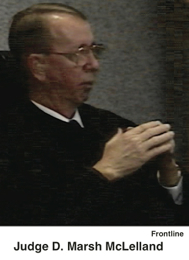Rascals case in brief
In the beginning, in 1989, more than 90 children at the Little Rascals Day Care Center in Edenton, North Carolina, accused a total of 20 adults with 429 instances of sexual abuse over a three-year period. It may have all begun with one parent’s complaint about punishment given her child.
Among the alleged perpetrators: the sheriff and mayor. But prosecutors would charge only Robin Byrum, Darlene Harris, Elizabeth “Betsy” Kelly, Robert “Bob” Kelly, Willard Scott Privott, Shelley Stone and Dawn Wilson – the Edenton 7.
Along with sodomy and beatings, allegations included a baby killed with a handgun, a child being hung upside down from a tree and being set on fire and countless other fantastic incidents involving spaceships, hot air balloons, pirate ships and trained sharks.
By the time prosecutors dropped the last charges in 1997, Little Rascals had become North Carolina’s longest and most costly criminal trial. Prosecutors kept defendants jailed in hopes at least one would turn against their supposed co-conspirators. Remarkably, none did. Another shameful record: Five defendants had to wait longer to face their accusers in court than anyone else in North Carolina history.
Between 1991 and 1997, Ofra Bikel produced three extraordinary episodes on the Little Rascals case for the PBS series “Frontline.” Although “Innocence Lost” did not deter prosecutors, it exposed their tactics and fostered nationwide skepticism and dismay.
With each passing year, the absurdity of the Little Rascals charges has become more obvious. But no admission of error has ever come from prosecutors, police, interviewers or parents. This site is devoted to the issues raised by this case.
On Facebook
Click for earlier Facebook posts archived on this site
Click to go to
Today’s random selection from the Little Rascals Day Care archives….
Click for earlier Facebook posts archived on this site
Click to go to
Today’s random selection from the Little Rascals Day Care archives….
Death noted: Little Rascals judge Marsh McLelland
 April 13, 2015
April 13, 2015
D. Marsh McLelland, judge in the trials of Little Rascals defendants Bob Kelly and Dawn Wilson, died last month in Burlington. He was 94.
This laudatory obituary in the Greensboro News & Record barely mentions the most consequential case in McLelland’s career – “He was brought out of retirement by the state’s chief justice to hear the Little Rascals Day Care child sex abuse case….” – and this one in the Burlington Times-News mentions it not at all.
Had McLelland stayed retired, the prosecution of the Edenton Seven might well have been derailed early on.
The judge originally assigned to the case, L. Bradford Tillery, stepped down under pressure from Deputy Attorney General Bill Hart. Mark Montgomery, Bob Kelly’s appellate attorney, explains why:
“Hart did not like the way Tillery was handling the case. The final straw was when Tillery ordered Hart to turn over the State’s interviews of those kids who were not the subject of indictments. He did not order them given to the defense, as he should have done, but Tillery was going to look through them himself. If he had, he would have seen that most of the kids at the day care, including Hart’s adoptive daughter, had said nothing happened and the jury would have heard about that.
“To prevent that, Hart filed motions accusing Tillery of being biased against the State. Rather than punishing Hart, Tillery took himself out of the case to avoid any appearance of partiality. Enter McLelland.
“Because Tillery had already ordered the interviews turned over to the court, that was a done deal. But McLelland never looked at them. I stumbled across them in the exhibit room of the courthouse and informed the Court of Appeals in my brief. The failure of the State to turn over to the defense the interviews of kids who said nothing happened was one of the grounds for a new trial for Bob.”
Tillery clearly was stung by Hart’s ploy: “I have served as a judge of Superior Court for over 20 years, and I never found it necessary to take such a step…. Neither have I ever been made to feel before that one side or the other considered me to be not only an adversary but also fair game …. for reckless assertions.”
If only Tillery had responded not by resigning but by sanctioning Hart for withholding evidence.
‘Started as a rumor – not about molestation, not at first….’
June 24, 2013
“(I) followed the Little Rascals case closely in the Norfolk and other papers…. Moved by (its) strangeness and patent senselessness, as well as by reports nationwide at the time of what came to be tagged ‘false memory syndrome,’ I wrote and later published a short story inspired by the spectacular miscarriage of justice…. The thrust of my story was popular hysteria and jaundiced, ambitious therapists together with a grievous breakdown of the judicial system….
“I believe that behind the recovered memory and child abuse therapeutic notions of that time, so destructive of the lives of the Edenton Seven and many others, lies Freud’s almost immeasurable popular impact on our now so heavily sexualized culture – though the easy lure of the witch hunt seems to have been all too contagious in Edenton’s fearful, credulous and manipulable parents as well.”
– Historian and writer John L. Romjue of Yorktown, Va., responding to “Remembering the shame of the Little Rascals Day Care case” at North Carolina Miscellany (Oct. 24, 2011)
Although “Witches of Devon,” the title story in Mr. Romjue’s 2002 collection, veers dramatically from the course of the Little Rascals case, it does indeed capture the essence: “It had started as a rumor – and not about molestation, not at first. There had been an ‘assault’ incident at Happy Children (day care). Joanne Jamison had spanked a little girl’s bottom and not suitably apologized to the mother….”
Did fear of Bob Kelly keep women behind bars?
Jan. 25, 2012
I’ve heard again from the anonymous caller who responded to my ad in the Elizabeth City Advance addressing children involved in the Little Rascals case.
The caller reiterated her certainty that she had been sexually abused by Bob Kelly, but – to my shock – she expressed doubts about the degree of involvement of other defendants, especially the young women who worked at the day care.
“I don’t hold any grudges against them,” she said. “I think he made them do whatever they did – it wasn’t on their own.”
Why then would these women choose to stay imprisoned, when testifying against Bob Kelly would’ve won them instant freedom?
“They were scared of him,” she said.
Does that seem probable? Or even conceivable?
Robin Byrum, 19 when she was arrested, spent almost a year in jail before her bond was reduced from $500,000 to $200,000. Meanwhile, her husband took care of their 7-month-old son.
In “Innocence Lost: The Plea” (1997), Byrum explained why she had been tempted by but repeatedly refused the prosecutors’ deal: “…. I would not ever have to be separated from my child again. But then I’d have to live with the rest of my life that I (said I) did something when I didn’t do it.”
Transgender movement compared to hysterias of 1980s and ’90s
 Nov. 21, 2016
Nov. 21, 2016
“Transgenderism would refute the natural laws of biology and transmute human nature. The movement’s philosophical foundation qualifies it as a popular delusion similar to the multiple-personality craze, and the widespread ‘satanic ritual abuse’ and ‘recovered memory’ hysterias of the 1980s and ’90s. These last two involved bizarre accusations of child abuse and resulted in the prosecution and ruined lives of the falsely accused.
“Such popular delusions are characterized by a false belief unsupported by any scientific or empirical evidence and have a contagious quality that overrides rational thinking and even common sense. …”
– From “Psychiatry Professor: ‘Transgenderism’ Is Mass Hysteria Similar To 1980s-Era Junk Science” by Richard B. Corradi at the Federalist (Nov. 17)
Dr. Corradi is professor emeritus of psychiatry at Case Western Reserve School of Medicine, where his opinion of transgenderism is “in no manner shared by this department or by Case Western Reserve or… the American Psychiatric Association or mainstream psychiatry.” A more widely accepted view: “You would think that a professor of psychiatry would know better” by David Cary Hart at the Slowly Boiled Frog (Nov. 18)
But what you won’t see debated among 21st Century psychiatrists and social scientists is Corradi’s characterization of “satanic ritual abuse” as “a popular delusion.” Perhaps one day the American Professional Society on the Abuse of Children will decide to join them.
![]()











0 CommentsComment on Facebook